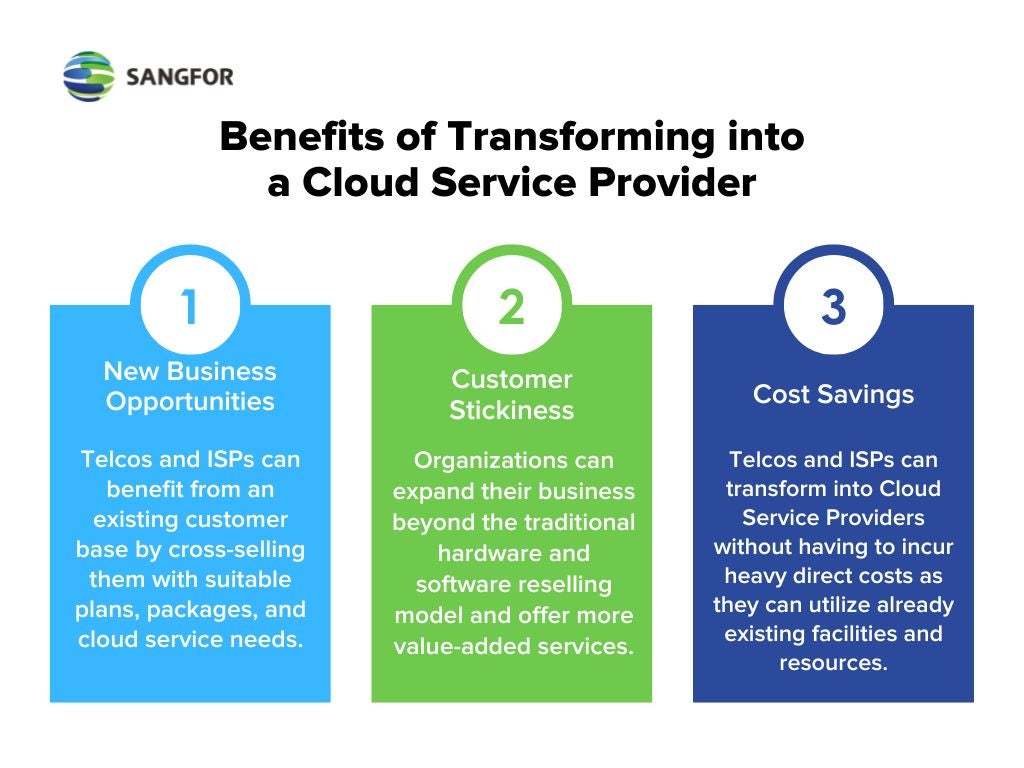Increasing Inclination Towards Cloud Infrastructure
Globally, a new trend is taking over organizations and businesses in response to changing consumer behavior. More than ever, consumers are looking for convenience, quality, and value in their purchase processes. As a result, many organizations are adopting Clouds Solutions to reach consumers’ expectations, seamlessly address their pain points, and provide excellent service. This is evidently reflected in recent predictions by Grand View Research about global cloud migration services to grow at a CAGR of 25.9% between 2023 to 2030. Cloud services enable organizations to capture impactful consumer insights, provide solutions to issues in a timely manner, and keep up with the latest digital shifts.
While this is beneficial to forward-thinking organizations and cloud providers, traditional Information and Communication Technology (ICT) industries such as Telecommunications (Telcos) and Internet Service Providers (ISPs) are losing momentum because of this trend. In response to changing consumer trends, organizations are shifting to public clouds, resulting in service reduction decisions. Specifically, they are requesting these ICT companies to decrease bandwidth for offices and data centers and rack rentals in data centers. Moving to the cloud means less bandwidth is required as all applications and data are hosted in the cloud. This also reduces the need for physical infrastructure in the data centers, thus the drop in rack rentals.
A New Promising Opportunity Amidst the Shifts
The good news is that Telcos (telecommunications companies & operators) and ISPs do not need to fret over their resources being underused. Their existing data center facilities, such as standard data centers, racks, inter-networking, and overseas and in-house bandwidth, can be strategically transformed into a revenue generation engine, in line with the evolving market and consumer demands. This engine is precisely called a Cloud Service Provider (CSP). Before we dive deeper into how Telcos and ISPs can benefit by providing cloud services, here is a brief explanation of what a CSP entails.

Cloud Service Providers: A Brief Introduction
Like the name suggests, a Cloud Service Provider (CSP) is a company that offers cloud computing services to businesses and individuals. These services can range from Infrastructure as a Service (IaaS), Platform as a Service (PaaS), and Software as a Service (SaaS).
A CSP’s main job is to provide customers with access to their computing resources, storage, and applications through the Internet. This access allows them to leverage the benefits of cloud computing without having to build and maintain their own infrastructure. While customers enjoy the computing resources, CSPs take care of underlying hardware and software as well as customer needs, such as security, support, and maintenance. Leading examples of CSPs include Amazon Web Services (AWS), Microsoft Azure, and Google Cloud Platform.
However, due to concerns over cost, security responsibility ownership, compliance (data sovereignty), service visibility, and vendor lock-in, there is a rising trend toward cloud repatriation (moving workloads back to on-premises). This shift also presents new business opportunities to local CSPs providing local (in-country) cloud services.
Benefits of Transforming into a Cloud Service Provider

New Business Opportunities
As aforementioned, cloud services are being adopted rapidly across many industries and organizations, opening a plethora of business opportunities. According to the latest forecast by Gartner, Inc. (October 2022), global end-user spending on public cloud services is predicted to grow by 20.7% to reach $591.8 billion in 2023, up from $490.3 billion in 2022. Against this backdrop, Telcos and ISPs can not only cater to new customers who want cloud, but also benefit from an already existing customer base by cross-selling them with suitable plans, packages, and cloud service needs.
Customer Stickiness
By offering cloud services, organizations can expand their business beyond the traditional hardware and software reselling model and offer more value-added services to their customers. Organizations can demonstrate value and create demand for cloud services by leveraging its benefits such as reliability, efficiency, and cost-efficiency. Furthermore, they can reduce their reliance on vendor products, build stronger relationships with customers, and elevate their satisfaction by offering the latest cloud services.
Cost Savings
Telcos and ISPs can transform into Cloud Service Providers without having to incur heavy direct costs as they can utilize already existing facilities and resources. They enjoy low entry and operating costs compared with other companies transitioning to CSPs and can easily adapt to the cloud due to their common roots in information and communication technology. In addition, transforming to a CSP can create an additional revenue generation engine for higher margins by utilizing existing facilities to minimize direct costs.
Stumbling Blocks Ahead
Transforming into a Cloud Service Provider is lucrative, especially in the current rapidly digitalizing world. But with the benefits come obstacles. While we discuss the potential roadblocks ahead, we also answer how to overcome them with the right support and deep expertise.
- Expertise and Experience Gap: One of the biggest worries that Telcos and ISPs face in their move to become CSPs is the lack of expertise and experience. This is especially true with new technologies and upgrades cropping up quickly. Transforming to a CSP requires organizations to learn in-depth about cloud computing, invest in new technologies and infrastructure, and, most importantly, develop a new business model with effective marketing and sales strategies to launch the cloud services into the marketplace.
- Lack of Technology: Although Telcos and ISPs have an upper hand in transforming to a CSP due to their existing facilities and resources, they may still lack the relevant latest technology. This speaks true, especially with a wide range of cloud models and services available, from private to public to hybrid cloud, and from Infrastructure as a Service (IaaS), Platform as a Service (PaaS), or Software as a Service (SaaS).
- Lack of SOPs: Standard Operating Procedures (SOPs) play a crucial role in accelerating an organization’s transition to a Cloud Service Provider. They provide clear guidelines outlining step-by-step procedures, best practices, and expectations on how to provide cloud services. It is also essential to ensure consistency and standardization across the organization. A novice CSP may require expert guidance and support to implement SOPs that foster team adoption, boost productivity, and ensure a successful transition to a cloud service provider.
- Unfamiliar with Local Laws and Regulations: New Cloud Service Providers (CSPs) may not be updated with the local regulatory, data privacy, and compliance laws and may run into a few problems. They may have to draw up new data compliance policies, which again require an in-depth understanding of local laws and regulations.
Making Your Digital Transformation Simpler & Secure: Sangfor Subscription Cloud Program
To better assist ICT companies like Telcos and ISPs in transforming into Cloud Service Providers, Sangfor launched the Subscription Cloud Partner Program. Sangfor Subscription Cloud is a complete cloud architecture and technology suite offered to aspiring CSPs to build their very own secure, robust, and enterprise-grade Cloud Platform. It is backed by Sangfor’s leading Cloud and Security product lines with native vendor services, such as Cloud Service Startup Consultancy, Security and Compliance Baseline Check, High-SLA Cloud Architecting Best Practices, Platform Operations Outsourcing, 24/7 Global Support, and B2B2C Professional Managed Services.
Why Choose Sangfor Subscription Cloud?
Besides the technical prowess, Sangfor Subscription Cloud offers the following attractive benefits:
- Partner Centric: Sangfor Subscription Cloud is designed around IT service providers’ needs and their own customers’ digital transformation. To better assist Telcos and ISPs with their transformation, our Subscription Cloud offers a sustainable cloud journey right from the start. This is achieved by having a staunch focus on flexible partnership engagement, providing various partner-featured services, such as those from end-to-end full-stack Cloud architecture to GTM (go-to-market) planning and consultancy.
- Adoption Flexibility: There are two ways in which companies interested in transforming to Cloud Service Providers can adopt Sangfor Subscription Cloud. Conservative transformers who are risk-averse and methodological can start small and grow at their own pace with Stepwise Cloud Evolution. On the other hand, adopters can accelerate their cloud transformation by choosing One-Step Cloud Evolution by implementing a Unified Hybrid Cloud solution, reaping the benefits quickly. We help our partners aim for an optimal Return on Investment (ROI) by offering flexible program options, from progressive investment that starts with a minimum server cluster to going bold with multiple cloud sites.
- Secure and Compliant Services: Security is the leading cloud challenge for customers, especially since major Cloud Service Providers typically only take responsibility for protecting the underlying infrastructure and not the customer’s data and applications. Sangfor’s Cloud architecture and technology stack is integrated with Sangfor’s leading security products and supports protection from Managed Security Services. These empower you to take charge of protecting your customers’ cloud business, providing differentiated value, and instilling service confidence. Additionally, as a local CSP, you will cater to increasing data and operation sovereignty regulations mandated by countries to help customers maintain compliance.
- Expert Support & Backup: With over a decade of experience in the cloud computing industry and serving over 100,000 customers worldwide, Sangfor has established mature and flexible Cloud Evolution Frameworks as viable alternatives to public cloud. These cloud evolution frameworks are designed to address the actual pain points customers experience in their public cloud adoption and focus on providing differentiated value that ensures a smooth, cost-effective, simple, secure, and successful cloud journey. Besides, CSPs are supported by our in-house Cloud Operations Team, which has years of practical experience looking after numerous clouds.
Conclusion
The transformation of Telcos and ISPs into Cloud Service Providers (CSPs) presents a timely and strategic opportunity. As the demand for cloud services continues to surge, these traditional ICT industries have a unique advantage in utilizing their existing data center resources to enter the cloud market. This shift not only allows them to diversify and grow their revenue streams but also helps them stay relevant in a rapidly evolving digital landscape. Overcoming challenges such as expertise gaps and technology upgrades, with the support of programs like Sangfor Subscription Cloud, can pave the way for a successful transition. Ultimately, embracing this change can lead to increased customer satisfaction, cost savings, and a stronger market position in the era of digital transformation.
Frequently Asked Questions
A Cloud Service Provider (CSP) is a company that offers cloud computing services to businesses and individuals. These services can include Infrastructure as a Service (IaaS), Platform as a Service (PaaS), and Software as a Service (SaaS). These companies take care of underlying hardware and software including security, support and maintenance, allowing customers to fully focus on their strategic planning and operations.
The Sangfor Subscription Cloud Partner Program is a comprehensive support system designed to help our partners navigate the challenges of their cloud business transformation. By leveraging our proven technologies and methodologies, Subscription Cloud Partners can offer managed cloud services with a rich service catalog, enabling them to stay in lockstep with their customers' cloud evolution journey. You can think of it as creating your own local public cloud, with the added benefits of security and ease-of-service of a private cloud.
Most ICT Service Providers with plans for digital transformation, especially Local telecommunications companies (Telcos) that provide mobile and landline telephone services and internet access services, Internet Service Providers (ISPs), Independent Software Vendors (ISVs) that offer software applications and operating systems and develop web-based information and applications, and so on can avail the Sangfor Subscription Cloud Program. For detailed information, please visit our website www.sangfor.com, or reach out to us on our ‘Contact Us’ page.





